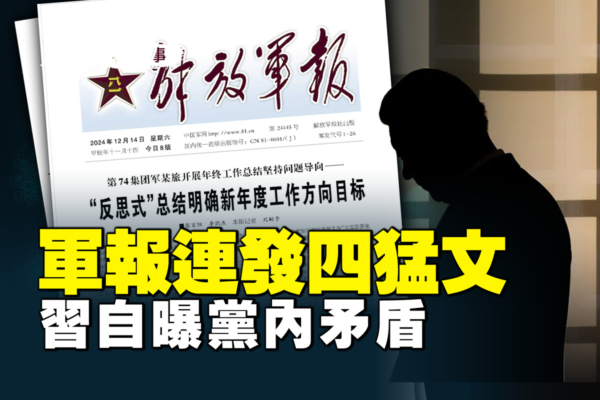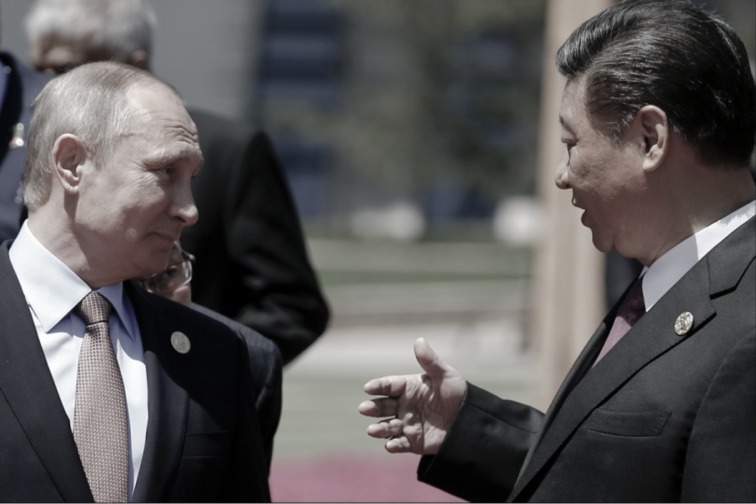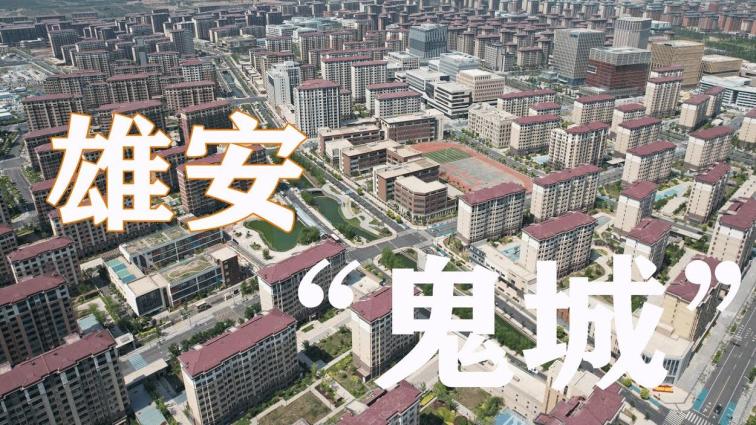Four Strong Articles in the PLA Daily: Is Xi Jinping’s Military Power Being Undermined? Xi Reveals Internal Party Conflicts (Provided by Tang Qing on Current Affairs)
[People News] At the politically sensitive time of the Beidaihe Conference, the PLA Daily on August 8 published a commentary in its “Strong Military Forum” column titled With a Heart of Guilt, Seek a State Without Guilt, authored by Ma Sibo of Unit 66429.
Unit 66429 is the code designation for the 5th Regiment of the 1st Guard Division in the Beijing Garrison. Official data shows that the Beijing Garrison commands the 17th Guard Regiment, the 1st Guard Division, and the 3rd Guard Division. The 1st Guard Division’s headquarters is located at No. 23 Fuxing Road, Haidian District, Beijing, and consists of the 3rd Guard Regiment (heavily armed), the 4th Guard Regiment (elite light rapid-reaction unit), the 5th Guard Regiment (elite light rapid-reaction unit), the 6th Guard Regiment (Central Guard Regiment), and an honor guard unit. The 3rd, 4th, and 5th Regiments are primarily responsible for guarding the CCP Central Military Commission headquarters, its top leaders, and their families. Given this, the fact that this article came from Unit 66429 at this particular political moment inevitably invites speculation.
The article opens with an anecdote from 1973: then–Premier Zhou Enlai, upon returning to Yan’an and seeing that some people still lacked adequate clothing and food, blamed himself for not being a good premier and felt he had let his fellow villagers down. The piece praises this “self-blame, self-reproach, self-reflection… a sense of responsibility to take on burdens and the courage that comes from knowing shame,” saying it is worthy of deep respect. Leaving aside the fact that Zhou, as Mao Zedong’s right-hand man, helped perpetuate the regime’s oppression and caused suffering to the people after the CCP seized power — making him equally responsible — the choice to single out Zhou Enlai from among all senior CCP officials surely has a deeper meaning.
The article then quotes Mencius: “A sense of shame is the beginning of righteousness” and “A person without a sense of shame is not human,” arguing that shame is an important moral emotion and a spiritual force for fighting for justice, nobility, and conscience. It says that reflecting on one’s “guilty” points is an important way to improve oneself and achieve self-purification, and cites Tang dynasty poet-official Wei Yingwu as an example.
Bringing the discussion into the present, the article states that CCP cadres should “know shame in governance to avoid disgracing official ethics,” and that only by maintaining a heart of guilt to seek a state without guilt can officials avoid being complacent about empty praise, self-admiring over minor achievements, or shamelessly engaging in “praise and self-praise.”
The implication is that, from top to bottom, CCP officials today generally have no sense of shame — meaning they have lost the most basic official ethics. If they did have shame, they would publicly apologise to the people after countless disasters. If they did have shame, there would not have been the violent suppression of protesters in Jiangyou, Sichuan; the “faecal water” drinking incident in Hangzhou; the severe lead poisoning of children in Tianshui, Gansu; or the tragedy where villagers went missing after a rainstorm.
Mainland Chinese people have long had personal experience with the shamelessness of CCP officials. The question is: why is the PLA Daily publishing such rhetoric now? Could it be related to internal discussions at the Beidaihe Conference? Did some senior CCP figure mention “guilt” and “being without guilt”? If so, who?
Records show that on August 21, 2018, People’s Daily published a commentary titled Always Cherish a Heart of Guilt Toward the People. It began with a story about Zhou Zhenxing, former Party Secretary of Heze, Shandong, slapping himself upon seeing a gravely ill elderly man who could not afford medical treatment, using this as a lead-in to explain “guilt toward the people” — meaning constant enthusiasm for the people, reverence for responsibility, and a sense of mission.
That piece specifically cited Xi Jinping’s 2004 writings when he was Zhejiang Party Secretary, urging cadres to pay attention to every “small matter” of the people’s lives, as these form the “cells” of the country and collective. Healthy “cells” make for a vigorous “body.” If officials are indifferent, impatient, or lazy about the people’s interests, they cannot claim to have “guilt toward the people.” Only with guilt can one be without guilt in governance.
In 2018, the CCP’s Flag website also published part of Xi’s Zhejiang New Words essays from his Zhejiang tenure, including a June 2003 piece titled Don’t Seek a Big Official Post, Only to Be Without Guilt Toward the People. In it, Xi wrote: “As an official, one should not seek a big post, but only to be without guilt toward the people. The people can clearly see how capable an official truly is.”
Besides Xi and his two Li-named premiers making statements about “guilt” and “being without guilt,” during the Hu–Wen era, then–Premier Wen Jiabao also made such remarks. On February 27, 2010, Xinhua published a news item titled Wen Jiabao: I Must Truly Be Without Guilt Toward the People, describing how Wen told online citizens he would “exhaust himself unto death and truly be without guilt toward the people.”
During his term, Wen occasionally showed a softer side — even bowing three times to ordinary people to express guilt and apology.
In January 2005, Wen visited miners at the Xiashijie coal mine in Tongchuan, Shaanxi, where a disaster had occurred. With tears in his eyes, he told them, “I’m sorry, I came too late.”
In January 2008, in Changsha, Hunan, Wen visited the families of three workers killed while de-icing power lines. He said, “I have no more words to comfort you, so let me bow to you.”
Before the 2008 Lunar New Year, Wen told stranded travellers at a train station: “The holiday is coming. I wish you a happy New Year. I apologise deeply that you’ve been stuck here and couldn’t go home early. We’re doing everything we can to repair the lines and get you home for the Spring Festival.”
In July 2011, Wen went to Wenzhou after the high-speed train crash, bowing twice with tears in his eyes to the families of victims.
Some say Wen was an “actor,” but if there were more such “actors” among the CCP elite, wouldn’t that be better? In the entrenched one-party dictatorship, Wen was relatively rare — though he accomplished little, at least he didn’t entirely shirk responsibility, which stands in stark contrast to the high officials of Xi’s era.
Since July last year, when rumors spread after the 3rd Plenum that Xi had lost power and Wen Jiabao and Zhang Youxia were behind the scenes controlling the situation, the PLA Daily’s mention of “guilt” and “being without guilt” during the Beidaihe period could well point to Wen Jiabao — especially given his earlier statements about “letting power operate in the sunshine,” “looking up at the stars,” and stressing that political reform and human rights are essential for China’s healthy development. Could the PLA Daily under Zhang Youxia’s command have published this commentary to signal support?
This speculation is not unreasonable. On the previous day, August 7, the PLA Daily published a report titled A Beijing Garrison Unit Deepens Educational and Practical Activities Closely Tied to Its Mission — Strengthening the Colour of Loyalty, Boosting the State of Struggle. The report was full of phrases about “loyally fulfilling duties and missions” and “forging strong political loyalty” — but tellingly, it did not mention “Chairman Xi,” “strong military thought,” or “Xi Thought” at all. The message to the outside world is that the Beijing Garrison’s current loyalty is no longer to Xi.
The PLA Daily sending out unusual signals on two consecutive days may reflect key issues being discussed at Beidaihe. For those in the CCP’s upper ranks who still have a conscience and hope for genuine happiness for the Chinese people and for the country to move toward openness and democracy, at this historic turning point, there is only one path to take — to be without guilt toward heaven and earth, and without guilt toward one’s own conscience.
(First published in People News) △











News magazine bootstrap themes!
I like this themes, fast loading and look profesional
Thank you Carlos!
You're welcome!
Please support me with give positive rating!
Yes Sure!